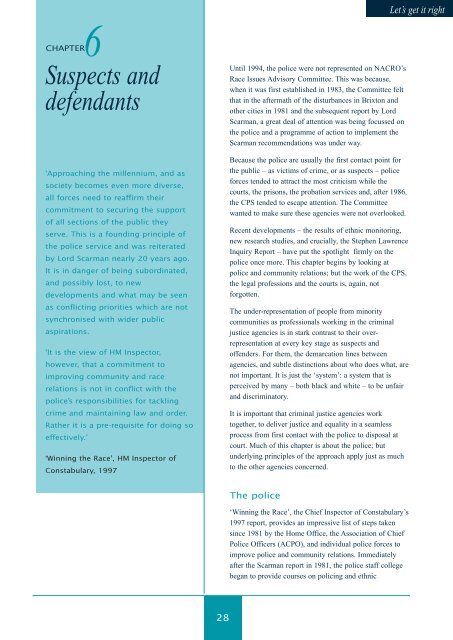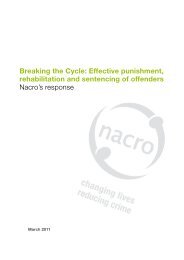Let's get it right: race and justice 2000 - Nacro
Let's get it right: race and justice 2000 - Nacro
Let's get it right: race and justice 2000 - Nacro
- No tags were found...
You also want an ePaper? Increase the reach of your titles
YUMPU automatically turns print PDFs into web optimized ePapers that Google loves.
Let’s <strong>get</strong> <strong>it</strong> <strong>right</strong>CHAPTER6Suspects <strong>and</strong>defendants‘Approaching the millennium, <strong>and</strong> associety becomes even more diverse,all forces need to reaffirm theircomm<strong>it</strong>ment to securing the supportof all sections of the public theyserve. This is a founding principle ofthe police service <strong>and</strong> was re<strong>it</strong>eratedby Lord Scarman nearly 20 years ago.It is in danger of being subordinated,<strong>and</strong> possibly lost, to newdevelopments <strong>and</strong> what may be seenas conflicting prior<strong>it</strong>ies which are notsynchronised w<strong>it</strong>h wider publicaspirations.‘It is the view of HM Inspector,however, that a comm<strong>it</strong>ment toimproving commun<strong>it</strong>y <strong>and</strong> <strong>race</strong>relations is not in conflict w<strong>it</strong>h thepolice’s responsibil<strong>it</strong>ies for tacklingcrime <strong>and</strong> maintaining law <strong>and</strong> order.Rather <strong>it</strong> is a pre-requis<strong>it</strong>e for doing soeffectively.’‘Winning the Race’, HM Inspector ofConstabulary, 1997Until 1994, the police were not represented on NACRO’sRace Issues Advisory Comm<strong>it</strong>tee. This was because,when <strong>it</strong> was first established in 1983, the Comm<strong>it</strong>tee feltthat in the aftermath of the disturbances in Brixton <strong>and</strong>other c<strong>it</strong>ies in 1981 <strong>and</strong> the subsequent report by LordScarman, a great deal of attention was being focussed onthe police <strong>and</strong> a programme of action to implement theScarman recommendations was under way.Because the police are usually the first contact point forthe public – as victims of crime, or as suspects – policeforces tended to attract the most cr<strong>it</strong>icism while thecourts, the prisons, the probation services <strong>and</strong>, after 1986,the CPS tended to escape attention. The Comm<strong>it</strong>teewanted to make sure these agencies were not overlooked.Recent developments – the results of ethnic mon<strong>it</strong>oring,new research studies, <strong>and</strong> crucially, the Stephen LawrenceInquiry Report – have put the spotlight firmly on thepolice once more. This chapter begins by looking atpolice <strong>and</strong> commun<strong>it</strong>y relations; but the work of the CPS,the legal professions <strong>and</strong> the courts is, again, notforgotten.The under-representation of people from minor<strong>it</strong>ycommun<strong>it</strong>ies as professionals working in the criminal<strong>justice</strong> agencies is in stark contrast to their overrepresentationat every key stage as suspects <strong>and</strong>offenders. For them, the demarcation lines betweenagencies, <strong>and</strong> subtle distinctions about who does what, arenot important. It is just the ‘system’: a system that isperceived by many – both black <strong>and</strong> wh<strong>it</strong>e – to be unfair<strong>and</strong> discriminatory.It is important that criminal <strong>justice</strong> agencies workto<strong>get</strong>her, to deliver <strong>justice</strong> <strong>and</strong> equal<strong>it</strong>y in a seamlessprocess from first contact w<strong>it</strong>h the police to disposal atcourt. Much of this chapter is about the police; butunderlying principles of the approach apply just as muchto the other agencies concerned.The police‘Winning the Race’, the Chief Inspector of Constabulary’s1997 report, provides an impressive list of steps takensince 1981 by the Home Office, the Association of ChiefPolice Officers (ACPO), <strong>and</strong> individual police forces toimprove police <strong>and</strong> commun<strong>it</strong>y relations. Immediatelyafter the Scarman report in 1981, the police staff collegebegan to provide courses on policing <strong>and</strong> ethnic28

















